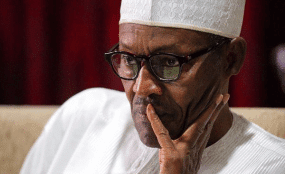

guest column
By Jean Herskovits
Nationwide-wide electrical outages nearly shut down Africa’s largest economy before the inauguration of President Muhammadu Buhari in late May. But now the lights are on, the miles-long petrol queues are gone, and oil refineries, if not fully operational, are showing signs of life. Banks and automatic teller machines again have funds. To the surprise of everyone, endemic violence is down country-wide, apart from Boko Haram’s suicide bombings in the northeast.
Life is looking up for Nigerians. Western journalists, however, have barely noticed.
Nigeria presents a fascinating case, one that political analysts could only dream of creating, to test a time-worn proposition: That the person at the top makes all the difference. President Muhammadu Buhari’s mere presence—the knowledge that he will not tolerate ‘business as usual’—has already brought a striking change in behavior. As a friend put it in colorful pidgin, “Impunity don’ quench.”
When President Buhari was inaugurated on 29 May, the changed atmosphere was palpable in the capital Abuja and nationwide. ‘Ordinary’ people were smiling and hopeful, as they had not been for years. They had ousted a sitting president in an election that reflected their will.
Few in Nigeria or elsewhere believed it could happen.
The electorate believed in one key thing about the man they chose to lead the country: his integrity. They welcomed his determination to end the off-the-charts corruption that had eaten deep into Nigerian government and life in general, especially in the last 15 years.
President Buhari is only now, through detailed briefings, gaining a full appreciation of the problems at every level of governance. Malfeasance and dysfunction have long deprived Nigerians of minimal basics that could – and should – have been theirs all along.
For many, including urban poor, restored electrical power now means not just light but devices that work – such as pumps that deliver water and refrigerators that store medicines. Extortionist road blocks have vanished, easing travel. Attacks on oil pipelines have all but disappeared. Stable fuel prices allow better delivery of goods and services. Produce becomes more available and affordable, while farm incomes improve. Better security brings some peace of mind.
Perhaps more remarkably, some former highly placed officials have been quietly returning both government property and millions of U.S. dollars, in the obvious hope of escaping prosecution while hanging onto other millions.
Of course, no president’s first ‘100 days’ in office can show what can be accomplished in the future, which is why President Buhari prefers not to recognize that bench mark.
Added to the depths of widespread systemic problems, in education and health care, for example, the precipitous drop in world oil prices has severely constrained the resources available to the new administration. Comprehensive policies to tackle Nigeria’s multiple ills are not yet in place.
Articulation of such policies – which even the president’s strongest supporters recognize as urgent – and implementing them effectively will further test the administration’s abilities. Most important will be the extent to which the president and his appointees can institutionalize the changes they bring. It will take time for Nigerians and the world to see those results.
Nigerians widely agree that President Buhari’s few appointments thus far have been made on merit, starting with the leadership of military and security services and the national oil company. Underscoring the priority of ending criminal corruption, the new appointees have opened investigations into inflated or even fictitious contracts that diverted national resources into private hands. There is popular clamor for arrests and imprisonment, but the president is committed to allowing investigative and legal processes to run their often laborious course.
Some Nigerians, especially those in politics, are impatient for President Buhari to name his cabinet and fill other top positions. Bloggers and tweeters fret over what they see as “regional and gender imbalance” in appointments so far.
The president says that he will take whatever time is necessary to ensure that his appointees possess the competence and the high ethical standards to withstand scrutiny for the duration of their tenure. He has pledged that Nigerians of merit from all over the country will have a chance to serve.
Meanwhile, the general run of Nigerians are more patient. They continue to smile and hope.
Jean Herskovits is research professor of history at the State University of New York, Purchase and has been writing about Nigerian politics since the 1970s. She has visited Nigeria three times this year.


